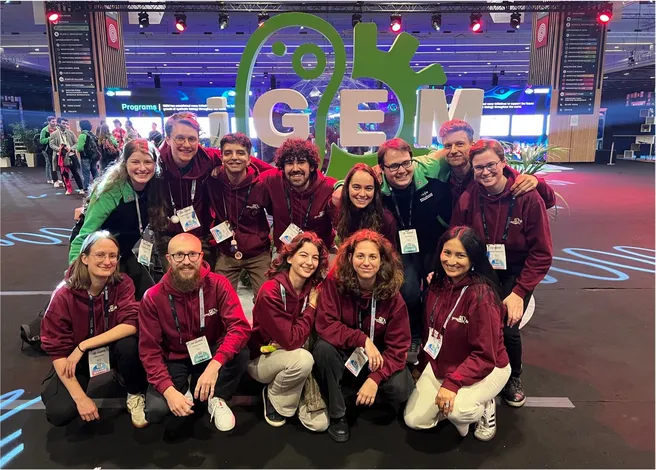More than 400 student teams from around the world gathered in Paris in October 2024 to present their innovative research in the field of synthetic biology. In front of an international audience of over 10,000 people, the iGEM Munich team, led by Prof. Gil Westmeyer, introduced its project ProgRAM: Programmable RNA Access Memory – and was awarded a gold medal along with a nomination for the best software tool.
The research project by iGEM Munich aims to enable cells to record events inside them—without relying on DNA as a storage medium. Instead, the team uses RNA as a molecular storage system, inspired by computer memory. This is implemented using a special enzyme (Cas13b-ADAR), which specifically modifies RNA sequences, creating a traffic light system for monitoring biological processes. This innovative method allows for rapid and non-destructive analysis of stored information.
The Munich team was also actively involved in science communication. Among other activities, they organized an interdisciplinary panel discussion on the role of artificial intelligence in modern biology and held workshops, including Girls' Day and iGEM@school. A particular success was their interactive, 3D-printable puzzle, which playfully explains the central dogma of molecular biology.
Another highlight of the team’s work was the development of the iGEM Data Explorer, an AI-powered tool designed to improve access to scientific content in the iGEM wikis. Given the more than 4,470 projects developed over two decades, this tool aims to make essential information more accessible.
At the Grand Jamboree in Paris, iGEM Munich presented its project not only at its own booth but also in two live presentations before experts from academia and industry. The gold medal and nomination for the best software tool affirmed the significance and innovative strength of their work.
We spoke with Raya Moyankova from the iGEM Munich team about her experience with the project.
Hi Raya, thank you for answering a few questions about iGEM:
What are you studying at TUM, and how did you learn about iGEM?
I am studying Molecular Biotechnology in my bachelor's degree and am currently in my fourth semester. I first heard about iGEM during a career orientation day at my former school in Sofia, Bulgaria. A professor from the Bulgarian iGEM team introduced the project there, and I was immediately fascinated. I was determined to participate and researched whether there was a team at TUM. In fact, even before my enrollment, I knew I wanted to be part of the project during my studies. Through the TUM team’s Instagram page, I found information about the kickoff seminar – and that’s how I joined the iGEM Club.
What was your role in the project, and what did you enjoy the most?
I was particularly excited about working on our main project, ProgRAM: Programmable RNA Access Memory. We had the opportunity to speak with leading experts worldwide who gave us valuable advice. For instance, we contacted researchers at MIT whose publications formed the basis for our project. Our laboratory work was conducted in the facilities of our principal investigator, Prof. Gil Westmeyer, who provided us with outstanding support throughout the project and competition.
Before starting laboratory work, we performed computer simulations to verify whether our ideas would work in practice. In addition to scientific work, we organized numerous outreach events such as Girls' Day and iGEM@School, where we welcomed school students to our campus. Our goal was to present our ideas to the public and discuss the role of synthetic biology – our panel discussion on the significance of artificial intelligence was particularly engaging.
How was your experience working in an interdisciplinary and inter-university team?
Thanks to iGEM, I was able to collaborate with students from other universities, such as LMU, as well as different schools within TUM, such as the School of Natural Sciences. This interdisciplinary teamwork was incredibly enriching—especially through the exchange with bachelor's and master's students from various fields. I learned a lot and was inspired to engage in other projects at TUM. As an international student, iGEM made me realize the vast number of exciting opportunities available here.
What experiences did you gain that will help you in your future studies or career?
You don’t just learn a lot about lab work, but also about self-organization and teamwork. It is particularly important to make independent decisions and draw conclusions from practical experiences for future experiments. This independence is very motivating and also helps in my studies. Additionally, I learned how to communicate efficiently within a team, better assess my own strengths, and realistically plan how much time specific tasks require. I will now pass on all these experiences as an advisor to the next iGEM team.
Would you recommend other students to participate in such a project?
Absolutely! iGEM was the best experience I had in my first year in Munich. I made many new friends and quickly felt at home in the city. Moreover, I learned an incredible amount and collected unforgettable memories. A special highlight was the trip to Paris, where we met teams from all over the world and exchanged ideas about our projects—everyone was highly motivated and had great fun at the event.
How can students participate in the iGEM project?
Interested students can learn more about iGEM through our Instagram page or website. Additionally, there is a kickoff event every October or November, where you can learn more about the project and how to get involved.
Dear Raya, thank you for the wonderful interview!
The iGEM Munich team would like to express its gratitude to the TUM School of Natural Sciences, whose financial support made the project possible.
Further information and links:
Press Contact
